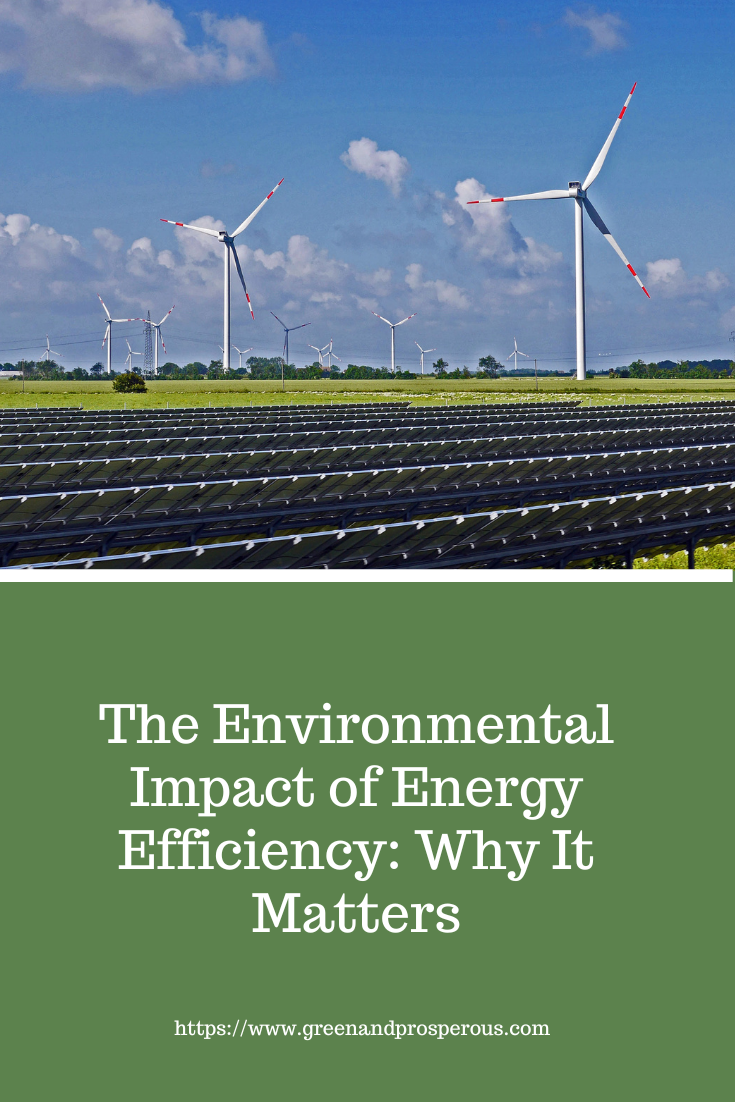The Environmental Impact of Energy Efficiency: Why It Matters
/Many people recognize that our society has reached a point of environmental urgency. Without taking measures now, the irreversible effects of climate change could prove disastrous for generations to come. Therefore, citizens and businesses alike need to find ways they can make sustainable adjustments, whether that’s turning to green energy as a whole or finding smaller ways to make a difference.
One of the effective practices here, and in the future, is energy efficiency. This is the process of responsibly navigating the tools we use in day-to-day life and company operations so that they don’t use more electricity than is necessary. With some planning and targeted strategies, you can use power in a way that is good for the planet and everyone living on it.
Understanding the Impact
Energy efficiency doesn’t have to be as dramatic as switching to renewable energy at home or businesses changing manufacturing processes to purely recycled materials. Nevertheless, taking even small steps can make a big difference. Getting to know the impact of energy consumption is not just a way to motivate yourself to make changes, but it also serves the practical purpose of enabling you to make informed decisions about what improvements to make and why they are effective.
The primary way in which energy efficiency makes a difference is that it minimizes the production of power generated from fossil fuels. When households and businesses alike use energy inefficiently, this means they’re drawing unnecessary amounts of power from these sources. As a result, they put greater pressure on the natural resources, impacting the surrounding ecosystem. Not to mention that they’re causing more significant greenhouse emissions from excessive energy production.
The impact isn’t just limited to the natural landscape, though. It’s important to recognize that the onset of climate change presents public health risks. Milder winters often affect natural pest control, which can contribute to the spread of insect-borne diseases. The rise in extreme weather conditions can inhibit or damage crop production, which in turn affects people’s nutritional wellness. Emissions from energy production may trigger respiratory illness, too. Therefore, the cumulative acts of energy efficiency help to slow the onset of climate change and support a healthier population.
Measures for Homes
Impactful energy efficiency in the home is achievable with some simple steps. Some require relatively minor adjustments, while others will need investment. It’s worth identifying measures to reduce your energy bills by minimizing your home’s consumption.
For instance, improving the efficiency of your heating, ventilation, and air conditioning (HVAC) system by regularly replacing filters means your system isn’t working harder and using more electricity than necessary. Using programmable thermostats that automatically regulate temperatures in the home, switching to lower levels of use when nobody's home, mitigates wastage. Even switching traditional bulbs for longer-lasting light-emitting diode (LED) alternatives boosts efficiency and lowers carbon emissions.
On a larger scale, your home’s insulation is a great tool for energy efficiency. Poor insulation can mean that heat or cool air escapes from your home more easily, meaning your HVAC systems use more energy to keep temperatures at the right level. Wherever possible, use sustainable materials, as doing so boosts the holistic environmental impact of your home. A good example is mineral wool insulation material, as it is made from recycled content and doesn’t require additional chemicals to be fire resistant. It’s also important to ensure your windows are correctly sealed to prevent energy leakage.
Additionally, integrating renewable energy sources can enhance energy efficiency in your home. For example, solar panels, while an investment, can significantly offset your household's reliance on grid electricity, providing clean, renewable energy for years to come. Similarly, battery storage systems allow homeowners to store excess energy for use during peak times, maximizing efficiency and reducing overall costs.
Strategies for Businesses
When it comes to having an impact through energy efficiency as a company, it’s vital to be strategic in your approach. As with so much else in business, the better you can understand and consistently apply green protocols, the more useful it will be for everyone involved. Your company's bottom line is healthier, as is the planet.
Some strategic measures you can implement include the following:
Energy efficiency audits
It’s vital to make efficiency improvements that are relevant to your business’s specific needs. Therefore, the first step is to perform regular energy efficiency audits alongside the usual electrical safety inspections. This includes arranging inspections of your building’s insulation and structure alongside the functioning of its HVAC systems. Wherever possible, gather data on the energy use of any equipment in your company. Consider installing sensors in the Internet of Things (IoT) and smart energy systems to collect real-time data on where the most inefficient consumption is occurring. You can then make targeted improvements based on this information.
Employee training
It’s not just your company’s buildings and equipment that boost energy efficiency. Your staff’s behavior is vital, too. Therefore, one of the focus points for your strategy must be to provide employees with training on responsible energy use. This includes making sure to shut down equipment rather than leaving it on standby and turning lights off when they’re the last to leave a room. Even teaching them how to time block similar tasks so they perform energy-heavy activities in one go, rather than leaving machines switched on all day, can be positive both for the planet and productivity.
Leveraging technology
Another key aspect of energy efficiency in businesses is investing in innovative technologies. Automated lighting systems, for instance, can ensure that lights are only in use when needed. Similarly, energy management software can help track patterns and identify wastage. Cloud computing is another approach; transitioning to cloud services can reduce the need for on-site servers, cutting energy costs and usage dramatically.
Conclusion
Energy efficiency is one of the most accessible and impactful methods citizens and businesses can use to promote sustainability. Alongside these practices, it’s worth regularly researching energy efficiency, as new tools and processes to preserve resources are always emerging. Indeed, you can have an even greater impact by talking to friends, family, colleagues, and business connections about your efforts. By encouraging others to be energy efficient, you’re helping your community and the planet.
About the Author:
Katie Brenneman is a passionate writer specializing in lifestyle, mental health, and eco-friendly-related content. When she isn't writing, you can find her with her nose buried in a book or hiking with her dog, Charlie. To connect with Katie, you can follow her on Twitter.
You may also be interested in…











































Many people recognize that our society has reached a point of environmental urgency. Without taking measures now, the irreversible effects of climate change could prove disastrous for generations to come. Therefore, citizens and businesses alike need to find ways they can make sustainable adjustments, whether that’s turning to green energy as a whole or finding smaller ways to make a difference